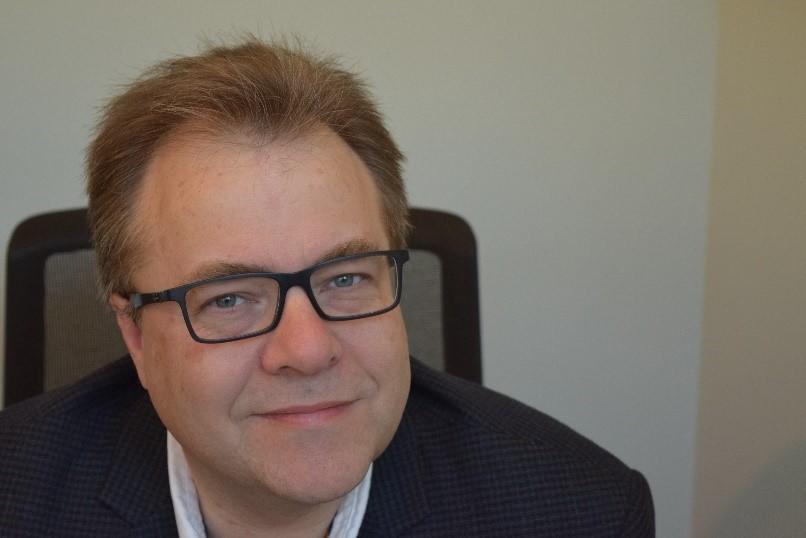Mark Lemmon, Ph.D., a CSBC Investigator at Yale University, is a biochemist who examines molecular mechanisms and integrated networks in cancer.
His career journey began in high school, when his chemistry teacher first explained enzymes.
The concept that a protein could perform chemical reactions was revolutionary to Dr. Lemmon at the time, and catalyzed his career in biochemistry.
After studying biochemistry at the University of Oxford, he traveled to the U.S. for graduate school. Working on his thesis research at Yale University, Dr. Lemmon became interested in understanding how signals get across cell membranes.
By this time, cell surface receptors were starting to be recognized as important mediators of cancer. This led him to the field of cancer biology and his current research investigating the effects of membrane receptor signaling in tumorigenesis.
In this interview, he discusses research collaborations, the application of systems approaches for cancer research, and emerging areas for cancer systems biology.
How have collaborations helped you during your career in cancer research?
I’ve collaborated with a pediatric oncologist, Yaël Mossé, for ten years. She discovered that mutations in a cell surface receptor, called Anaplastic Lymphoma Kinase (ALK), are responsible for ~14% of neuroblastoma cases. Working together, we found that specific ALK mutations can determine the therapeutic benefit of particular clinical ALK inhibitors.
Yaël and I also work with Ravi Radhakrishnan, who is a computational biologist. We are using neuroblastoma sequencing data to generate mechanism-based algorithms that can predict whether a new patient mutation in ALK is likely to drive the cancer, and thus, when to use ALK inhibitors clinically.
Ravi and I are also co-investigators of a Physical Sciences - Oncology Network project focused on liver cancer. We hypothesize that increased tissue stiffness shifts cell surface signaling towards a proliferative and oncogenic response.
Cancer research becomes less challenging or complex if we split a research question up with relevant experts.
How does systems biology contribute to studies of cancer?
If you think about biology, which is built on robust networks, you quickly realize that uncontrolled tumor growth must be caused by defects in the integrated network. Following this logic, the only way to cure cancer is to understand the networks and systems in cells, between cells and their environment, and across the entire organism.
What do you think will be challenges in cancer systems biology research in the next 10 years?
I recently discussed a challenge of the field in a Cell interview. In systems biology, we’re collecting a lot of data. My worry is that we can get overwhelmed by all these data. It’s important to use the data and not be used by the data.
I also think that current approaches to analyze large amounts of data can be too focused on correlation and machine learning. Just collecting data about a tumor and getting correlations doesn’t mean we understand the biology. The application of machine learning is warranted in these early stages of data collection; however, we need to move towards models of dynamical systems.
How do new systems biology technologies help trainees and young investigators studying cancer?
Now, the current and next generation of trainees in the field can utilize state of art RNA sequencing, proteomics, metabolomics, mass cytometry, etc. to study cancer and effectively do thousands of experiments at once. They can command multiple technologies and integrate the results into new, holistic views of cancer.
What are emerging research areas in cancer systems biology?
One area is the transcriptome. For example, microRNAs and other non-coding RNAs will define complex regulatory networks that we need to understand to control cells.
Another important area is the relationship between metabolism and cancer, particularly the idea of oncometabolites and their epigenetic effects.
A third area is timing. We tend to think about cell signals as being ‘on’ or ‘off’. Yet it is increasingly clear that the dimension of time plays an important role.
My lab showed in that the kinetics of epidermal growth factor (EGFR) signaling defines biological outcome. Specifically, sustained EGFR signaling can promote differentiation whereas transient EGFR signaling causes proliferation. More studies of kinetics in cancer networks are needed to appreciate this complexity.
How will CSBC-supported research help cancer patients?
Current targeted cancer therapeutics act as blunt knives, or hit targets that can easily be overcome. I think that research across the CSBC will lead to the next generation of effective cancer treatments that will control or correct networks to bring cancer cells ‘back into line’.
